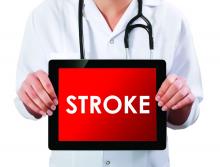The provision of general anesthesia during endovascular therapy for acute ischemic stroke patients with large-vessel occlusions did not result in more infarct growth when compared with conscious sedation in a new randomized trial, contrary to previous findings.
Furthermore, the single-center, open-label, blinded-endpoint General or Local Anesthesia in Intra Arterial Therapy (GOLIATH) trial also reported that patients randomized to the general anesthesia (GA) group had improved functional outcomes on the modified Rankin Scale at 90 days, with a 91% greater likelihood for lower scores than with conscious sedation (CS) (odds ratio, 1.91; 95% confidence interval, 1.03-3.56).
Discrepancies in the findings of previous observational and randomized trials left questions remaining over “what was the best practice for EVT [endovascular therapy], including which anesthetic strategy results in the best clinical outcomes,” wrote Claus Z. Simonsen, MD, PhD, of the Danish Stroke Center at Aarhus (Denmark) University Hospital, and his colleagues. The report was published online in JAMA Neurology.The GOLIATH trial randomized patients to general anesthetic (n = 65) or conscious sedation (n = 63). The average age of the patients was 71.4 years and 48.4% of the cohort were women. The patients’ median National Institutes of Health Stroke Scale score was 18 (interquartile range [IQR], 14-21), and the initial infarct size was also comparable between the GA and CS groups, respectively (median [interquartile range], 10.5 [2.4-23.6] mL vs. 13.3 [5.2-31.1] mL; P = .26)


